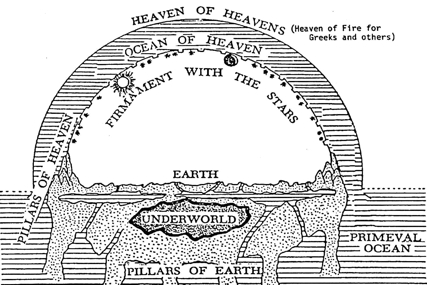
 |
Freethought & Rationalism ArchiveThe archives are read only. |
|
|
#21 | |
|
Veteran Member
Join Date: Jun 2010
Location: seattle, wa
Posts: 9,337
|
 Quote:
|
|
|
|
|
|
#22 | |
|
Banned
Join Date: Aug 2011
Location: Midwest
Posts: 46
|
Quote:
T. Moreux, former head of Bourges Observatory, France: "this expanse, which to us constitutes heaven, is designated in the Hebrew text by a word which the [Greek] Septuagint, influenced by the cosmological ideas prevailing at the time, translated by stereoma, firmament, solid canopy. Moses transmits no such thought. The Hebrew word raqia only conveys the idea of extent or, better still, expanse." The International Standard Bible Encyclopaedia on the solid vault illustrations that appear in Bibles from the dark ages: "But this assumption is in reality based more upon the ideas prevalent in Europe during the Dark Ages than upon any actual statements in the O T."—Edited by J. Orr, 1960, Vol. I, p. 314. |
|
|
|
|
|
#23 | |
|
Junior Member
Join Date: Apr 2007
Location: Dallas, TX
Posts: 79
|
I am fond of Richard Elliott Friedman's translation and commentary:
Quote:
(And why did the ancients believe there was "water above" as well as water below? Because the sky is blue -- so on the other side of our little bubble there must be another sea, every bit as blue as the Mediterranean.) The idea of raqia as a physical boundary separating the waters is vital to the plot, because in a few chapters this physical barrier will be punctured during the Noachic flood. And that makes the flood not merely a really bad rainstorm, but a full-out cosmic crisis. The waters above and below are reuniting, threatening to undo everything from the second day of creation onward. And if you're into comparative mythology, there are some interesting parallels here to the Ba'al Cycle and the fight with Yamm or his pet dragon Lotan. |
|
|
|
|
|
#24 | ||
|
Contributor
Join Date: Mar 2002
Location: nowhere
Posts: 15,747
|
Quote:
If you can't argue the point, you find someone who has the same opinion as you and waste our time making yourself feel a little better. When you have something to say about the language, that's when you should post. |
||
|
|
|
|
#25 | ||
|
Banned
Join Date: Aug 2011
Location: Midwest
Posts: 46
|
Quote:
Quote:
The luminaries came to be in the expanse, the birds fly in the expanse, the clouds form water in the expanse rather than fall from literal windows. The term windows from heaven releasing water during the deluge was metaphorical, the water cycle was explained without that literal explanation, God said that the heavens would become copper not that they were copper, Elihu's statement that the sky was said to be "like a molten mirror" not a molten mirror itself, as is confirmed by the Hebrew word for sky, shachaq which means film, dust or cloud. Not solid. One thing years of debate has taught me is that when the debate becomes an attempt to convince someone their preconceived notions are not substantiated by the facts you know it has gone too far. I'm not trying to convince you of anything and only ask the same. You are trying to convince me of your beliefs which present the Bible as having been written by people who didn't understand science as it is understood today which is beside the point. The idea, though, that I would do anything to appease science which is thousands of years behind what the Bible actually did say is an insult. Science, to me, is a whining infant's blind attempt at assuming current knowledge is infallible. The religious made the same mistake during, the Dark ages. Full circle. |
||
|
|
|
|
#26 | |||||
|
Contributor
Join Date: Mar 2002
Location: nowhere
Posts: 15,747
|
Quote:
Quote:
Quote:
Quote:
Job 37:18 tells us that god has beaten out (רקצ) the sky (שחק) strong or hard (חזק) as a mirror.You are told that the shachaq is solid. It is beaten out as a goldsmith beats out and the parallel is about metal, ie a poured mirror. This should tell you that the writer is working the meaning of shachaq away from what you want. Quote:
|
|||||
|
|
|
|
#27 | |||
|
Senior Member
Join Date: Jan 2011
Location: Sydney, Australia
Posts: 730
|
Quote:
Such a claim is absurd even on its face. Since the Bible is available almost universally, how can its "science" be in advance, if we all have ready access to its supposed knowledge? :huh: Quote:
 Quote:
|
|||
|
|
|
|
#28 | ||
|
Regular Member
Join Date: Mar 2004
Location: Europe
Posts: 132
|
Quote:
However, it is not as if I spoke Hebrew. I can only fumble around with things like this: http://www.blueletterbible.org/Bible...2&t=KJV#conc/2 ----------------- And am I the only one who caught this one: Quote:
|
||
|
|
|
|
#29 | |
|
Senior Member
Join Date: Apr 2011
Location: Bronx, NY
Posts: 945
|
Quote:
You are trying to make a case that the ancients had a better understanding of the cosmos than they are typically given credit for. How is this not appeasing science? If science is not the issue, what difference does it make? |
|
|
|
|
|
#30 | |
|
Contributor
Join Date: Mar 2002
Location: nowhere
Posts: 15,747
|
Quote:
|
|
|
|
| Thread Tools | Search this Thread |
|